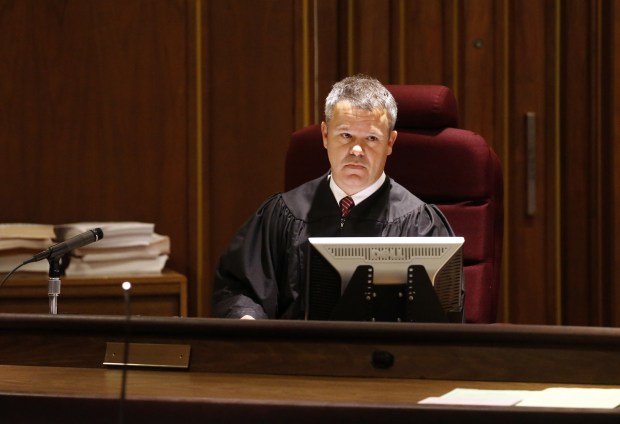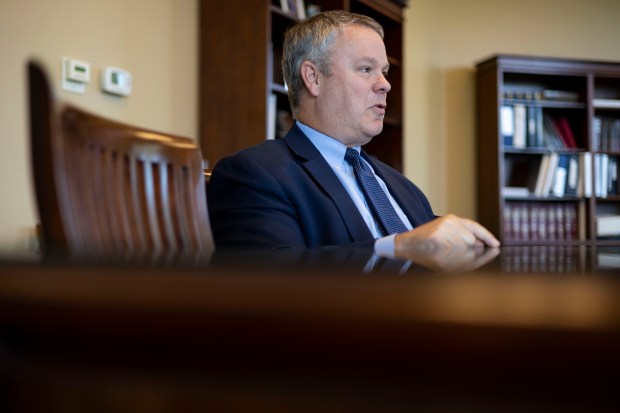Kane County Judge Clint Hull and I have more than a few things in common, including a love for youth sports and a passion for true crime.
But over the years what’s drawn us together on a professional level is the compelling criminal case of Sandra Vasquez.
I covered that story from the time we learned about the 2007 crash that claimed the lives of five Oswego teens Vasquez was driving home from a party to her release from prison in 2023.
Hull, who had only been serving on the 16th Circuit Court bench a few months after 17 years as a prosecutor, presided over that high-profile and emotional trial and sentenced Vasquez to 15 years in prison after a jury found her guilty of vehicular homicide.
That trial, he’s told me many times, was among the most memorable of his long career, not only because of the number of young victims and all the families impacted but because of the deeply moving remorse the defendant showed.
Although that was his first DUI trial as a judge, reckless homicides had become Hull’s specialty as a prosecutor. And he has continued to use that experience to promote awareness about drunk driving to thousands of kids and their parents across the Chicago area.
Now, while sifting through thick files of letters, notes, newspaper articles and other memorabilia as he prepares to retire from that 32-year career, Hull can’t help but look back and declare, “How blessed I’ve been.”
“Going through all this I realize each is a point in time in my career … I think about the impact on my family, the victims … the mistakes I made. At each point in time that case was the most important to me,” he told me when we sat down to talk recently in his office on the third floor of the Kane County Judicial Center.
“Hopefully I brought a level of authenticity” to both positions, he said. “I’ve had so many opportunities to make a difference and have tried to take advantage of that.”
Hull is particularly proud of the relationships he’s built over his career – with prosecutors and judges, with police investigators and with victims’ families, and still maintains contact with some of them.
He still thinks of them, perhaps more so lately as he looks back on that career, including the 80-plus cases that went to trial and his very first case as a prosecutor in 1993 that he thought would end his career before it ever got started.
Hull shows me the gracious thank-you letter he received from the chief security officer of the lumber yard, where an employee was charged with stealing enough material to build his own barn, yet got the slam-dunk case thrown out because of a discovery error the rookie prosecutor made.
“How different my life would have been if (the lumber company) had gone to the state’s attorney and demanded I be fired,” said Hull. “When I talked to high school kids, as a prosecutor and a judge, I would bring that letter to show them that you can’t be afraid to fail … you have to make mistakes to find out what works and what doesn’t work.”
How different Hull’s life might also have been had the young St. Charles man been able to land a job with his communications degree from the University of Illinois.
After losing out on a position as a buyer for a department store, Hull’s mother Jean, a longtime St. Charles teacher, suggested he follow in the footsteps of her grandfather and become an attorney. But it was not until 1991, in Hull’s second year of law school, that he attended a Kane County Bar Association seminar and “got struck by lightning.”
After listening to heavyweights Gary Johnson (then Kane County state’s attorney), John Barsanti, Dave Camic and Jack Donahue speak about the “anatomy of a criminal trial,” Hull walked out of the room knowing “what I wanted to do with the rest of my life.”
Hull went home and wrote letters to each presenter, getting a response back from Johnson, who not only offered him good advice but an intern position for that summer.
Now a well-known defense attorney, Johnson describes that decision as “the best hire of my life,” noting the outstanding career Hull has enjoyed since becoming an assistant state’s attorney in ‘93.
As a prosecutor “he’s what we call a good touch,” said Johnson. “He knew what case was worth taking to trial, how far a defense attorney would go to get rid of little cases, like auto burglaries and retail thefts” that can jam up the courts.
And Hull was not about to be outworked, added former state’s attorney and now Judge John Barsanti, who noticed how Hull “distinguished himself very quickly” in Kane County.
“Clint was always the student,” Barsanti said. But he was also “a hard charger,” who would come in on Saturdays even when doing traffic court and “stick around to help” anyone else needing assistance.
Hull carried that same work ethic to DeKalb County in 2000 when he was asked to take on a significant backup of cases there that included high-profile murders and reckless homicides.
So impressed with this rising star, when Barsanti became Kane County state’s attorney in 2004 he made Hull his first assistant state’s attorney, where he went on to bolster his reputation in the courtroom.
There were many cases that stood out, like the 2005 killing of 20-year-old Nicholas Swanson of Elgin – a case which attracted hordes of media because of 17 defendants who got caught up in a heinous crime through social media and texting.
Technology continues to play a huge factor in cases, Hull said, noting a recent murder sentence he handed down, where the fatal shooting played out entirely on video, first through a doorbell camera and then the victim’s own cellphone.
Other memorable defendants included John Homatas, who received 12 years in prison in 2007 for driving drunk after leaving a strip club and killing his friend and a Yorkville woman and her unborn child in a crash near Elgin.
“As a prosecutor, there is anger at what these DUIs have done to the victims and their families, but as time goes on, you realize there are more situational factors at play,” Hull told me. “There are few evil people I’ve prosecuted. Most are in the wrong place or with the wrong people or under the influences of drugs or alcohol.”
Yet the ripple effects of these unintentional felonies are devastating, he said, specifically recalling the 2012 Chain O’ Lakes boating tragedy that killed 10-year-old Tony Borcia.

Kane County Judge Clint Hull begins proceedings in the 2013 sentencing hearing of David Hatyina at the Lake County Courthouse in Waukegan. Hatyina pleaded guilty earlier that year to aggravated driving under the influence of drugs and alcohol in the 2012 boating accident that killed 10-year-old Tony Borcia. (Stacey Wescott / Chicago Tribune)
In a cold plea agreement, Hull, who was sent to Lake County to preside over the case due to a potential conflict of interest issue, sentenced David Hatyina to 10 years in prison in 2013. Hatyina had pleaded guilty earlier that year to aggravated driving under the influence of drugs and alcohol in the boating accident that killed Tony Borcia.
Like Vasquez, the 51-year-old Bartlett man, who had a daughter with Down syndrome, showed genuine grief and remorse, but also had a previous conviction of operating his boat while intoxicated.
One of Hull’s toughest and most memorable cases – his third child was born, fortunately, over the weekend so he could be back in court on Monday – was the “mostly circumstantial” DeKalb trial of a man who was acquitted of bludgeoning his wife to death.
“I never put more into any case,” the then-prosecutor said of those 80-hour work weeks that required the patience of wife Amy and the help of other family members, including his mother and mother-in-law to help raise his children.
“The emotion, the energy, the passion it takes for these trials,” he recalled. “I was all in.”
Yet Hull still found time to stay involved with home and community. He coached his children’s sports teams for a dozen years and, because assistant state’s attorneys didn’t make much money back then, coached a travel soccer team and worked as a certified referee, always grateful for an office near his home in St. Charles where he’s lived all his life.
Sports has always been a tenet in Hull’s life. Among the many awards and other accolades decorating his office is the encased medal he received as a member of the 1984 St. Charles High School Saints soccer team that placed third in state when he was a captain.
“I was an overweight sophomore who wanted nothing more than to be part of that team. That’s where I learned that passion and work ethic can do amazing things,” he said, adding that the “best prosecutors often come from sports backgrounds” because they not only have that competitive drive, they know how to win and lose in public and be able to bounce back after a defeat.
Also among his framed accolades is a 2007 award from the Chicago Crime Commission for work as a prosecutor with Operation First Degree Burn, a cold-case sweep that indicted more than 30 men in 22 cold-case gang-related homicides stemming back decades.
Even though Barsanti’s state’s attorney’s office lost that first case connected with the sweep, most went to prison, which shows “we were not afraid to go to trial,” said Hull, noting that the nationwide trend to plead cases can shortchange younger attorneys from the trial experience needed for big cases.
Hull admits his goal was always to be a state’s attorney. But the timing was not right because of his friendship with mentor Barsanti. And so, when an associate’s judgeship became available in 2009, he put on the black robe and again rose to the occasion.
In 2016 Hull was appointed circuit court judge in the 16th Circuit and elected to that position two years later. He served in traffic, misdemeanor, family law and felony courts, and was presiding judge of the Juvenile Division, where he took pride in building relationships with young offenders.
Hull, who is active with St. Charles School District boosters and is president of its Jodie Harrison Hall of Fame Committee, has always taken an interest in guiding young people. About a decade ago he took his DUI awareness campaign a step further, partnering with fellow Judge Susan Boles to create Worries of the World Wide Web. In 2017, the Illinois Judges Association adopted that social media awareness program and took it statewide.
St. Charles School District 303 Superintendent Paul Gordon describes Hull as “one of the good humans in the world,” who has made a profound impact on the district through these eye-opening sessions for students and parents.
“I sat in on a session and walked away with my jaw on the ground,” he said, noting the honest but powerful conversations the former prosecutor and judge could have about the consequences of poor decisions.
“He really cares about young people,” added Gordon. “But that goodness, kindness and respect extends to everyone.”
Those traits came in handy when Hull was selected as chief judge in the 16th Judicial Circuit in December of 2019. A few months later, the pandemic hit, closing down courts and throwing the system into turmoil.
Hull’s stint in that leadership role “was at the toughest time … but the way he handled it was incomparable,” said Johnson, referring to how Kane County became a model for others, quickly implementing “Zoom and new rules before anyone else … that moved cases along” and kept the system working.
“He loved doing trials but also had a flair for administration because he knew how to get the most out of people,” added Johnson.
Jill Gasparaitis, supervisor of court reporters, agreed that this chief judge was in the right place at the right time.
“The pandemic was a scary time in the beginning. But Judge Hull had already built those relationships in place that made it easier for people to work together,” she said. “As chief judge his style was to get to know people in every department so he could find out how things can be done better.”
Equally impressive, according to Barsanti, was his leadership ushering in the controversial Safe-T Act, which dramatically reformed the criminal justice system.
“The thing about Clint is that other people might say he’s a micromanager. But the Safe-T Act required a leader to stay on everyone’s ass to get things done,” which is especially critical in government, he said, where everything turns at such a slow pace.
Not only did Hull “push to make it happen,” continued Barsanti, the county became one of three court systems in Illinois chosen to pilot this mandate.
Hull was not done reforming, however.
Pulling up a color-coded spreadsheet on his computer, the judge showed me how a recent collaboration among judges and attorneys in Kane County has greatly reduced the time defendants spend in jail. This system not only alerts judges of cases that have been dragging, meetings are held weekly that bring together major players in the court system to talk about ways cases won’t end up stalling.
There were 107 inmates who had been in jail in Kane County for over a year in May of 2021, and that number now stands at 40, Hull proudly stated. As for those awaiting trials more than three years, it took just six months to reduce the number from 10 to two.
So what now for the judge after he turns in the keys to the courthouse following a Friday retirement party? As much as he loves his John Grisham novels and true crime podcasts, he admits there are no plans to go quietly into full retirement.
Hull, who is experiencing a not-surprising mix of emotions, can’t say publicly what his next step will be. But he points to a Chicago Tribune editorial he saved that laments the “slow-moving crisis at the Supreme Court over ethics standards.”
The headline, he tells me, says it all: ”Even a Supreme Court justice at day’s end is a public servant.”
It’s those last two words, Hull insists, that will continue to direct his future.
“Every day there are different opportunities to be a public servant,” he said. “I don’t think there is a higher calling.
“So many people, so many organizations have invested in me,” he said. “And I am a better person because I had the chance to give back to the community … I need to continue doing the same.”
dcrosby@tribpub.com




